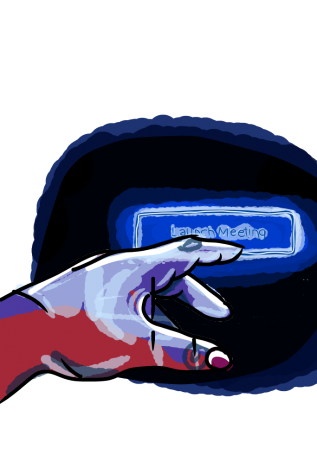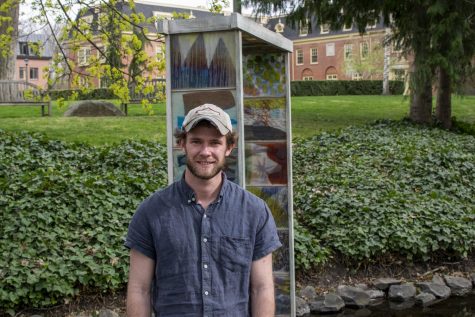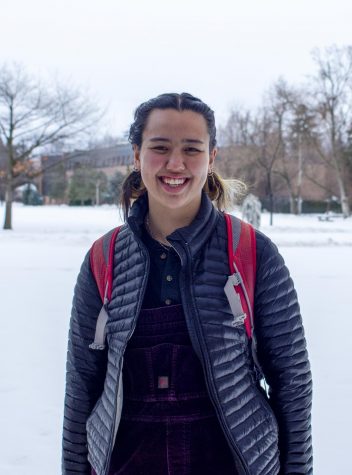Students Apply for Fulbright, Watson Opportunities
October 15, 2015
The Fulbright U.S. Student Program and Watson Fellowship, which provide yearlong educational experiences in a foreign country, are highly sought-after grants and fellowships at Whitman. The Fulbright and Watson offer similar a similar opportunity: the chance to go abroad for a year and learn about an area of interest either through research, teaching, or travel. They differ, however, in the specificity of the projects they encourage and how they are awarded.
“What [Director of Fellowships and Grants Keith Raether] and I often remark on is that the Watson is more about the whole person,” said Administrative Assistant for Fellowships and Grants McKenzie Lynn. ”The Fulbright is just as competitive … you have to prove yourself and highlight that you’ve been a leader, that you have teaching experience, or that you’re incredibly academic and can go abroad and study the same thing for a year. But the Watson is more about the person – it’s about who you are and how the project will affect you.”
There are two types of Fulbright grants: study or research grants associated with an art project or research in any discipline, and English Teaching Assistantships (ETA) focused on English education and a community project in a foreign country. ETAs are generally more popular among Whitman students.
“The main difference is [with] research you have an affiliated professor or some sort of academic at a university or institution in the country who you’re going to work with for a year and that’s what your grant is for,” said senior Noah Oltman, who is a candidate for an ETA in Germany. “[For the ETA] you’re sent to an assigned country and you work about part-time, 30 hours a week maybe, as an English teacher and … they want you to show that you have some alternative plan for community engagement. So it’s a combination of teaching and an outside project to facilitate a cultural exchange.”
This year there are 24 applicants for Fulbright grants from Whitman. Generally, only a handful of applicants actually receive grants, with eight recipients last year matching the highest in recent memory. The process requires the ability for an applicant to articulate why they should receive the opportunity to work abroad and exchange ideas across cultures.
“The key really for Fulbright is to indicate why you are pursuing this experience in the country of choice … and to indicate your ideas of engaging across cultures: how are you going to immerse yourself in the host country and engage with that community, bringing your own experiences as an American to the table and learning from theirs?” said Director of Fellowships and Grants Keith Raether.
A major way in which this can be expressed for the ETA is through a project outside of teaching that is focused on community.
“There’s also a community-based aspect to it where … you have to do something in addition to teaching English. So what I’m looking at doing is creating a network of intellectually and developmentally disabled individuals very similar to the Buddy Program we have at Whitman, getting them together, doing different activities with them, and educating the community on how to be more inclusive to individuals with these disabilities,” said senior Jeremy Nolan, a candidate for an ETA in Mexico.
The Watson Fellowship, on the other hand, is a program supported by 40 liberal arts colleges that provides 30,000 dollar stipends to a select group of students. While there are similar requirements for Fulbright and Watson applicants, Whitman can only nominate four Watson candidates for a chance to earn one of 40 fellowship opportunities. This year, 14 students completed applications for review by the Whitman committee in charge of nominations.
“The application process for the Watson Fellowship is pretty rigorous. The application requires a [five] page personal statement, a [five] page project proposal, and [two] letters of recommendation. There is an internal deadline at the beginning of October, then from that applicant pool, the Whitman Committee selects a few applicants to nominate to the Watson Committee. The final 40 fellows from around the country are selected in March,” said senior Danielle Audino, a candidate for a Watson fellowship, in an email to The Pioneer.
The Watson also differs from the Fulbright in that its project is often less about research and more about an individual exploring a topic rigorously and independently for a year. Watson students are not allowed to reach out to friends or even other Watsons during their time abroad and instead are required to find their own accommodations and connections for their year of travel.
“The Watson … look[s] for students of unusual promise who are obsessed with something, who are mature and brave enough to go around for a year without a safety net at all because they’re not allowed to stay with friends or stay with family or even spend a lot of time [somewhere] that they’re familiar with. So everything has to be new and they have to be willing to navigate that,” said Lynn.
The Watson is thus focused on the individual and rewards individuals with a keen interest in a topic that can also reflect on their learning experiences over the course of the year.
“[A] Watson proposal should strike that delicate balance between you, and the values and experiences that make up ‘you,’ and the specifics of your project. The best Watson proposals, from what I’ve heard, seem to be located somewhere in the center, so that the individual can have a fascination and a relationship to what they study but will still be challenged and taken out of his or her comfort zone in the process,” said senior Brennan Johnson, a candidate for a Watson fellowship, in an email to The Pioneer.
Regardless of the differences, applicants for both the Watson and Fulbright note that the experience is worthwhile whether or not the applicant becomes a recipient.
“I have learned so much through this application process and no matter what happens, I am so glad that I applied! I would encourage everyone to apply if they have the opportunity. I gained a far better understanding of what motivates me and what I am passionate about through creating my project proposal,” said Audino in an email to The Pioneer.









